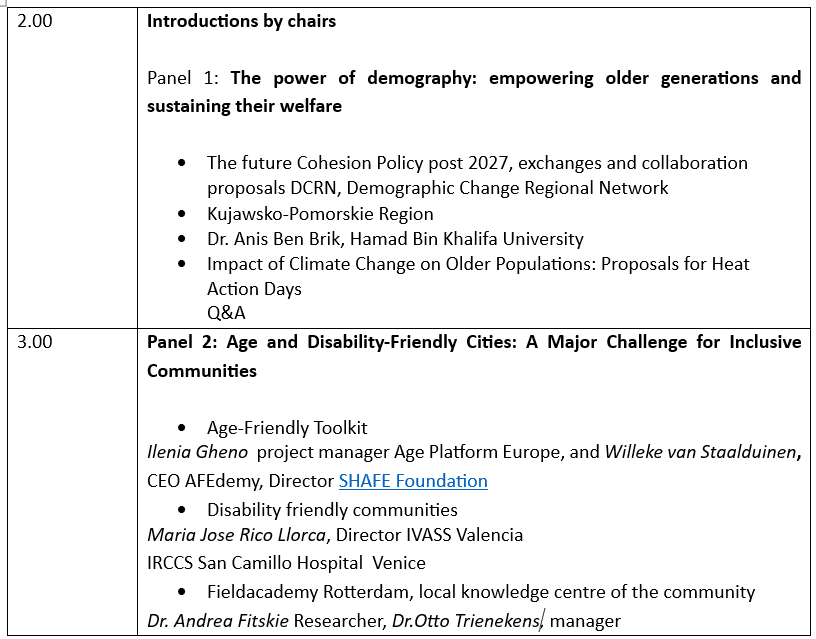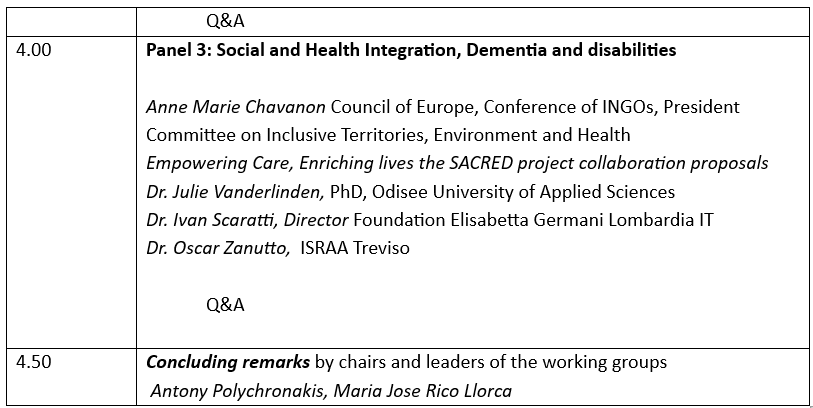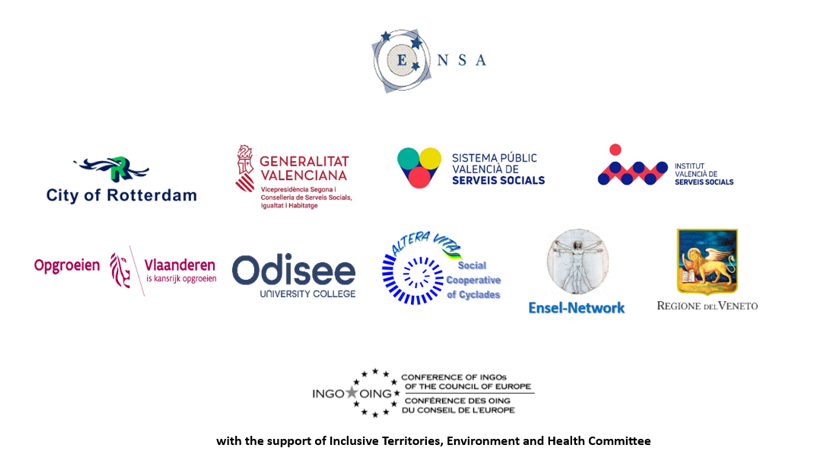Admin User
Blog entry by Admin User

ENSA GENERAL ASSEMBLY 2025
and connected activities,
Brussels, 3rd, 4th and 5th of March
Day 1 (3rd March): HOPE Conference “Cooling the Heat”: 9:00 AM to 5:15 PM.
Venue: House of the Dutch Provinces, Rue de Treves, 59-61, 1040 Brussels Belgium
Day 2 (4th March): ENSA General Assembly: 10:00 AM to 11:00 AM
Venue: Veneto Region’s Brussels Office, 67 Av de Tervueren 1040 Bruxelles
ENSA/ENSEL Youth, Child, Family and Well-being working group: 11:00 AM to 1:00 PM.
Venue: Veneto Region’s Brussels Office, 67 Av de Tervueren 1040 Bruxelles
Day 3 (5th March): ENSA Older Adults and Disability working groups: 2:00 PM to 5:00 PM.
Venue: Veneto Region’s Brussels Office, 67 Av de Tervueren 1040 Bruxelles
Detailed Programmes
Day 1, 3 March 2025
HOPE, Responding to Heatwaves in the Older People Ecosystem, Conference “Cooling the Heat”: 9:00 AM to 5:15 PM.
Venue: House of the Dutch Provinces, Rue de Treves, 59-61, 1040 Brussels Belgium
Summer is coming near again. To what extent are we prepared in Europe?
The Responding to Heatwaves in Older People Ecosystem (HOPE) project together with two leading networks of European authorities working in older adult care: European Network for Social Authorities (ENSA) and European Local Inclusion and Social Action Network (ELISAN) have the pleasure to invite you to a one day event entitled “Cooling the Heat!” that will take place in the House of the Dutch Provinces in Brussels on the 3rd of March 2025.
This event aims to discuss how to put the severe health threats of heatwaves on the agenda of the older adult service and healthcare sectors with an inclusive approach for the whole ecosystem. Specific focus will be put on developing and strengthening the competences of students, informal caregivers, and professionals in older adult health, care and social sectors on better responding to the needs of older adults during heatwaves and thereby better mitigating the risks.
Successful experiences will be exchanged in the following sessions:
• From policy to action regarding heatwaves.
• Manage the needs of older adults in an urban context;
• What skills are needed for (informal) caretakers.
Leading international experts and decision makers will be invited present and discuss innovative practices and policies, making the link with the European Pillar of Social Rights, the Sustainable Development Goals, the Urban Agenda for the EU.
You can register for the conference with the help of this registration form.
For any questions regarding the conference or the registration and for more information see the website of HOPE.

Day 2, March 4- ENSA General Assembly 2025
Veneto Region’s Brussels Office, 67 Av de Tervueren 1040 Bruxelles

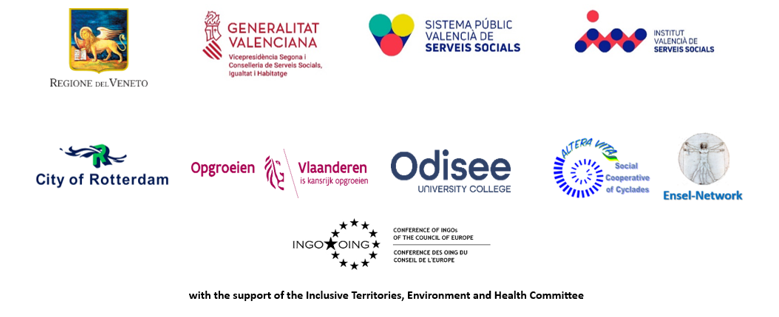
Day, 2 - March 4- ENSA General Assembly 2025
ENSA/ENSEL, Youth, Family, child and Wellbeing working groups
Venue:Veneto Region’s Brussels Office, 67 Av de Tervueren 1040 Bruxelles
Date: March 4 2025, 11- 13:00, Brussels
Chair: Miltos Sakellariou ENSA coordinator for Wellbeing and ENSEL network
Call for Contributions:
This workshop invites contributions on two vital themes for improving mental health:
A) Behavioural Disorders in Teenagers – Sharing effective strategies for preventing and addressing disruptive behaviors in adolescents, with a focus on early intervention and community involvement.
B) Climate Change and Health Prevention with an Intergenerational Approach – Exploring the role of youth in supporting older adults to mitigate climate change’s health impacts through intergenerational collaboration.
Event on site: for stakeholders not able to be on site contribution of Best Practices could be sent and will be put online on ENSA/ENSEL websites for dissemination and follow-up together with those of onsite participants
A- Behavioural Disorders in Teenagers
As part of ongoing efforts to address Behavioural Disorders in Teenagers, we invite professionals, organizations, and researchers to share their best practices, successful approaches, and innovative strategies for preventing, intervening, and treating these disorders. The aim is to exchange effective methods for addressing the complex challenges faced by adolescents with disruptive behaviours.
Context & Importance
Behavioural disorders, if untreated, can have long-term consequences, impacting relationships, employment, and quality of life. Early intervention is essential to help young people develop coping strategies, emotional resilience, and social skills. The European Union has prioritized mental health, focusing on early detection, prevention, and strengthening mental health policies for vulnerable populations like adolescents. A key aspect of this effort includes strengthening the resilience of foster parents who care for unaccompanied minors and refugees. These children often face unique psychological challenges stemming from trauma, displacement, and a lack of family support. By reinforcing the coping abilities of foster parents, we enhance the quality of life for these vulnerable children, ensuring they have the stability and support they need to thrive.
Causes & Risk Factors of Disruptive Behaviour Disorder (DBD):
Key risk factors include exposure to violence, family history of mental illness or substance abuse, familial discord, abuse and neglect, and poor or inconsistent parenting. Foster parents of unaccompanied minors and refugee children often face additional challenges such as cultural differences, language barriers, and trauma exposure. Training foster parents to effectively address these issues helps mitigate the risk of DBD and strengthens the children’s emotional resilience.
What We Are Looking For:
We are seeking contributions that showcase successful case studies, innovative programs, and effective strategies aligned with the EU's priorities. These contributions should focus on promoting the overall psychosocial well-being of young people—enhancing self-esteem, reducing loneliness, fostering communication skills, building resilience against negative influences, and empowering informed lifestyle choices. We specifically encourage efforts that include supporting foster parents in enhancing their emotional resilience to better care for unaccompanied minors and refugees. Additionally, we invite contributions that integrate modern, active learning methods, with a particular emphasis on the use of Artificial Intelligence (AI) to support these efforts.
Contributions should focus on:
• Prevention and promotion of mental well-being in adolescents
• Early detection and timely intervention strategies
• Parent and community involvement in supporting teenagers
• Integration of digital tools and AI to address social media’s impact on mental health
• Cross-sector collaboration between schools, health professionals, and authorities
B- HOPE Responding to Heatwaves in Older People ecosystem, Erasmus+ funded project, follow up on younger generations engagement
Climate Change and Health Promotion with an Intergenerational Approach.
As the climate crisis deepens, its effects are felt across all generations, but older adults are particularly vulnerable to the health risks associated with climate change. Extreme heat events, air pollution, flooding, and other climate-related events can have a disproportionate impact on older adults, now and in the future, making it crucial for youth working groups to understand and address these challenges with a focus on prevention and intergenerational collaboration. By adopting an intergenerational approach, where younger generations engage with and support older adults and by giving it a place in the curriculum of students in health and social domain, we can build stronger, more resilient communities that prioritize the health and well-being of all age groups, especially the older people
An intergenerational approach recognizes these vulnerabilities and empowers youth to collaborate with older adults, using collective knowledge and resources to mitigate the risks posed by climate change.
What We Are Looking For:
Collaboration with practices and initiatives related to:
Mental health support initiatives: where youth can promote mental health awareness and provide resources for older adults to access counselling, therapy, or community support groups during climate-related stress like heatwaves.
Advocating for climate-friendly healthcare policies and awareness initiatives, like heat action days where Youth can engage in advocacy for accessible, affordable healthcare that takes into account the needs of older adults in the face of climate change.
Creating Collaborative Community Initiatives
An intergenerational approach creates opportunities for younger and older individuals to work together in their communities to reduce climate risks. Youth working groups can partner with local organizations to establish programs that directly benefit older adults, including:
Why Contribute:
This is an opportunity to showcase your work, exchange insights with peers, and contribute to a broader European dialogue.
Your contributions will help to build future project proposals and initiatives, workshops, and seminars on this theme.
Experts contributions from:
• Josine van den Bogaard
Senior Advisor for Living Environment and Health, Municipality of Rotterdam | Public Health Service
• Esther Wienese
Project Manager Rotterdam Heat Plan, Municipality of Rotterdam / Public Health and Environment (GGD)
• Oscar Reigmerink, University of Applied Science of Rotterdam, Nederland
• Dott.ssa Silvia Faggian, Veneto Region, Direction Social Services, Organizational Unit for Dependencies, Third Sector, New Marginalities, and Social Inclusion
• Anne Marie Chavanon, Council of Europe, Conference of OINGs, Committee on Inclusive Territories, Environment and Health
• Prof. Dr. Cigdem Sahin Taskin, Canakkale Onsekiz Mart University (Turkey)
• Dr Miguel Vidal González, Spanish National Reference Centre CIPFP Misericordia, Valencia (Spain).
• Isabel Berckmans, Odisee University of Applied Sciences Lecturer in Ortho pedagogy
Research on meditation and compassion in social welfare
Chair: Miltos Sakellariou, ENSA-Coordinator for Wellbeing and ENSEL Network
We look forward to your valuable contributions to strengthen our collaboration
The ENSA/ENSEL, Youth, Child, Family, and Wellbeing working group teams
Practical Instructions:
Stakeholders who wish to disseminate and contribute a best practice should follow the template, which should include the following elements:
• Title: Title of the best practice.
• Summary: Provide a brief summary, highlighting the main theme and the target group.
• Purpose of the Exchange: Specify the objectives and intended outcomes of sharing the best practice.
• Contact Details: Include relevant contact information for follow-up.
To upload your presentation, please use the following link: 
ENSA/ENSEL Youth, Child, Family and Well-being working groups
Chair: Miltos Sakellariou: ENSA-Coordinator for Well-being and ENSEL Network
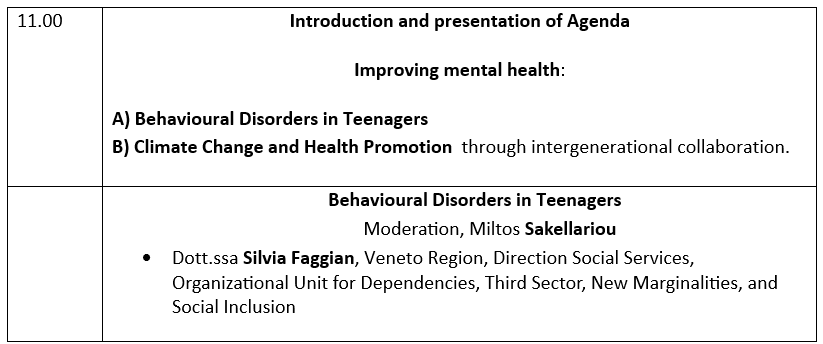
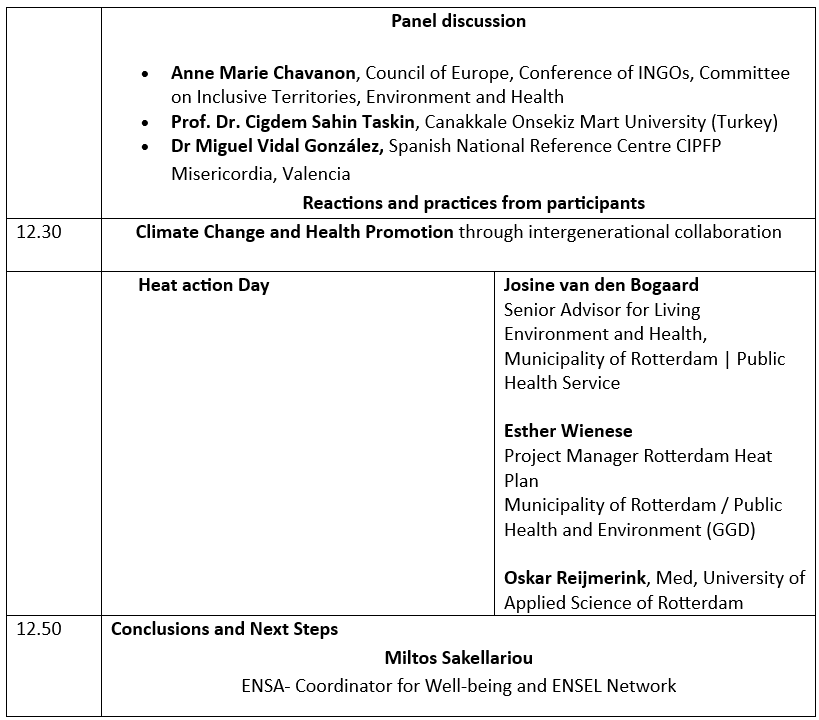
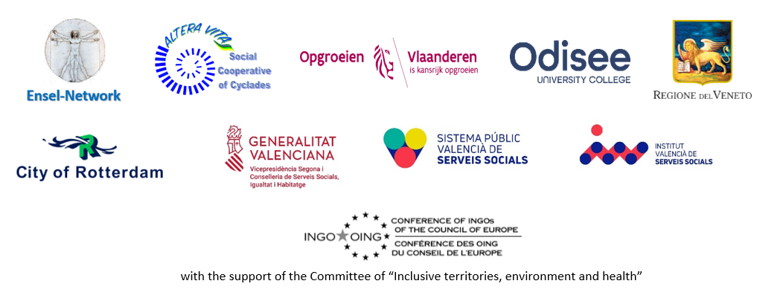
Day 3- March 5.
ENSA older adults and persons with disabilities working groups
Workshop: Addressing Demographic Change and Building Age and Disability-Friendly Communities
Date: March 5, 2025
Time: 2.00- 5.00
Venue: Veneto Region’s Brussels Office, 67 Av de Tervueren 1040 Bruxelles
On site: Stakeholders who cannot contribute on site can send their contribution or practice that will be disseminated for further exchange on the ENSA and ENSEL websites
Chairs and leaders, Anthony Polychronakis, City of Rotterdam, Maria Jose Rico Llorca, Director IVASS Valencia
Call for Contributions: this workshop invites contributions on the following themes:
- Challenges and opportunities in the field of demographic change and active ageing,
- Age and Disability friendly city and environments, dementia and disability friendly,
- Tackling the impact of Climate change on the older and vulnerable population developing proposals to contribute to heat action days.
- Long term care and social and health integration
Objectives and Framework of Exchanges:
1. The power of demography: empowering older generations and sustaining their welfare
Demography is a powerful force shaping the future of societies, influencing life expectancy, family structures, and living conditions. This thematic exchange will dive into demographic trends, particularly those affecting aging populations, and explore how regions, local authorities, and communities can adapt to these shifts with actionable, examples..
2. Age and Disability-Friendly Cities: A Major Challenge for Inclusive Communities
The creation of age and disability-friendly cities is essential for promoting autonomy and resilience among older individuals and people with disabilities. This involves designing inclusive urban environments that address both physical accessibility and social inclusion, fostering independent living and active participation. A key aspect is creating spaces where people in advanced recovery stages can share experiences with those in earlier stages. This discussion will explore how cities can assess and improve their accessibility by listening to residents and collaborating across sectors. Contributions from the AGE-FRIENDLY TOOLKIT project will share best practices, with insights from IVASS Valencia and San Camillo Hospital in Venice showcasing practical initiatives.
3. Tackling the Impact of Climate Change on Older Populations: Proposals for Heat Action Days
Older adults are particularly vulnerable to the impacts of climate change, especially during extreme heat events. This session will focus on strategies for mitigating these risks and developing concrete proposals for Heat Action Days, ensuring that older populations are protected during climate extremes.
4. Social and Health Integration: Enhancing Residential, Home Care, and Primary Care Services
Comprehensive integration of social and health services is essential for the well-being of older adults, whether they are receiving residential care, home care, or utilizing primary care services. This session will explore models for improving coordination between healthcare systems, social services, and community-based care, ensuring that older individuals have access to holistic, person-centred support. We will examine innovative care models that enhance quality of life and promote independence, as well as explore how these models can be expanded and adapted to meet the diverse needs of aging populations.
Practical Instructions for stakeholders willing to share a best practice
Stakeholders who wish to disseminate and contribute a best practice should follow the template,
which should include the following elements:
• Title: Title of the best practice.
• Summary: Provide a brief summary, highlighting the main theme and the target group.
• Purpose of the Exchange: Specify the objectives and intended outcomes of sharing the best
practice.
• Contact Details: Include relevant contact information for follow-up.
To upload your presentation, please use the following link: BEST PRACTICES
We look forward to welcoming you!
For the city of Rotterdam Anthony Polychronakis, for IVASS Valencia, Maria Jose Rico Llorca, Director IVASS Valencia
PROVISIONAL ¨PROGRAMME. 5 March 2025
ENSA OLDER ADULTS AND DISABILITY WORKING GROUPS
